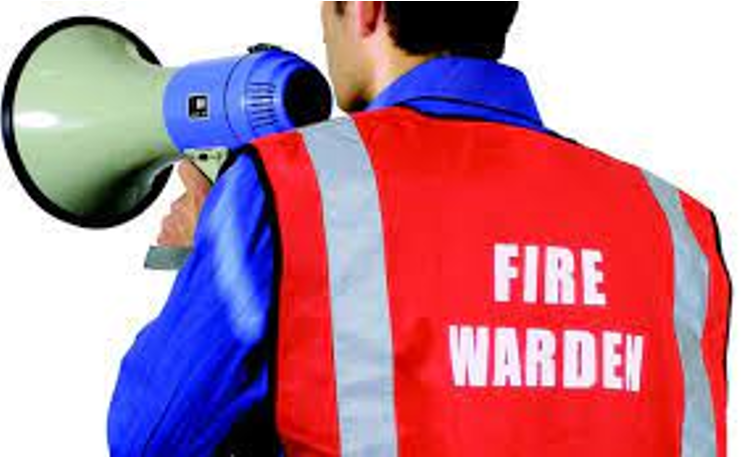Fire Warden
What is a fire warden
A fire warden (sometimes referred to as a Fire Marshal) is a person(s) designated by the person with the responsibility for workplace fire related activities. They implement the necessary fire safety arrangements to prevent a fire from endangering the health and safety of occupants and other relevant people for whom a duty of care is held e.g., customers in the pharmacy.
Fire Wardens play an important role in ensuring the continuity of the workplace and are prepared for a fire emergency. Along with the Emergency Plan all Fire Wardens are an important risk control measure to ensure the workplace is prepared should a fire occur.
Fire Warden Duties on a day-to-day basis
The duties of a fire warden may differ depending on the size, layout, structure size of the workforce but some standard duties could include:
- Checking fire alarms – Are alarms in working order and easily visible? Weekly fire alarms should take place to ensure all are in good working order.
- Checking emergency exits – Check they are free from obstructions and able to be opened easily in the event of a fire.
- Fire extinguishers – Are they available and easily visible? Are they regularly serviced?
- Fire doors – Check the fire doors are in good working order and are kept closed.
- Emergency lighting – The lights must be checked each month to ensure they are in good working order.
- Fire safety signs – Is there adequate signage? Is the signage securely fixed to the wall?
- General housekeeping – Are sources of heat kept apart from sources of fuel? Are hazardous/flammable/combustible materials stored securely?
- Electrical equipment – Ensure it is all PAT tested because faulty electrical devices are a common cause of fire in the workplace.
- Staff induction – All staff must have fire safety training. This should be part of a new staff member’s inductions, and something repeated to all staff on an annual basis.
- Fire drills – Carry out a fire drill annually at least. This provides a good opportunity to ensure everyone knows the drill in an emergency situation.
- Maintaining records – All fire safety activities should be recorded. Make a note of any hazards and any action taken to reduce or eliminate risk. This is important for compliance as well as being essential to ensure all safety procedures are being adhered to.
In the Event of a Fire
The top priority is to make sure everyone is safely evacuated from the building. To do so, fire wardens need to be able to:
- Raise the alarm.
- Close fire doors to prevent the fire from spreading.
- Ensure vulnerable persons are being assisted (this should be clearly explained in a Personal Emergency Evacuation Plan or PEEP).
- Ensure everyone has exited the premises. This must include restrooms, storage areas.
- Use firefighting equipment such as extinguishers only if it is safe to do so.
- Help with roll call. Every person needs to be accounted for.
- Liaise with emergency services.
Because the fire warden is responsible for so much the warden themself may not actually physically evacuate personnel and visitors but might delegate staff to do so on their behalf. In a fire they would usually be located at the muster / assembly point to co-ordinate everything, delegate responsibilities, communicate with evacuees and liaise with the emergency services.
What is the Legal Requirement for Having Fire Wardens?
The Health and Safety training website Workplace UK at the following link Worksafe UK Fire Wardens. tells us that "UK legislation requires every business to appoint fire wardens. The number of fire wardens your organisation needs depends on a range of factors. The general rule of thumb is that a fire warden should be able to perform their ‘sweep’ and reach a place of safety within 2 ½ minutes of hearing an alarm. At least two fire wardens are needed to cover a floor which is large or complex".
Other factors in determining how many fire wardens you need are mainly to do with the size of the premises, number of staff and type of business you operate. Furthermore, you must consider:
- If any occupants are high-risk, e.g., young, elderly, disabled, then you need to increase the number of fire wardens.
- Shift workers. Fire wardens need to be on site whenever there are people present. You need to consider this when shifts are organised.
- Staff absence e.g., sick leave and staff holidays. When a fire warden is sick or on leave, an alternative warden needs to be present.
- Are there flammable materials? Does your workplace have flammable materials such as stationery or flat pack boxes present? This could present a higher fire risk.
- Are there sources of ignition? A kitchenette is a source of ignition and increases the risk of fire.
Once fire wardens are appointed it is essential to make sure they are properly trained. They must be competent and able to carry out all the tasks required of them. There are various training providers which provide fire warden courses. These can be found and completed online or a nominated individual from the training provider can deliver the training in your own workplace. Both different training routes incur a financial fee.

